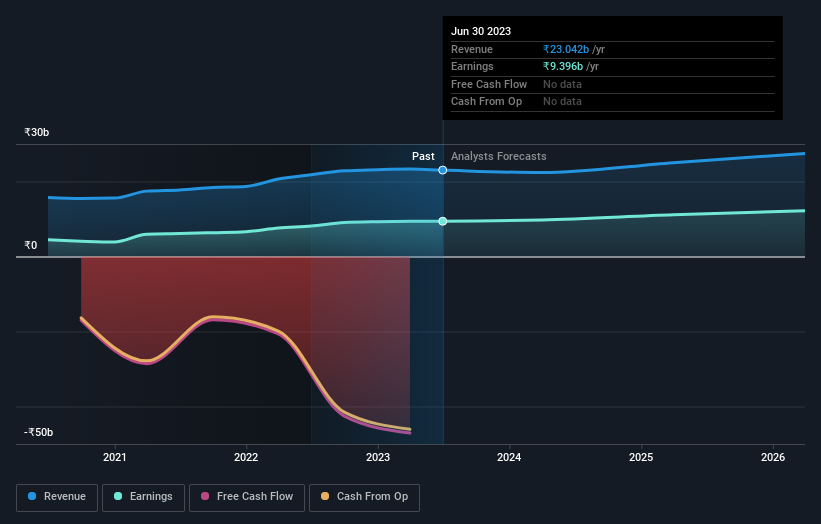Stock Analysis
City Union Bank Limited (NSE:CUB) institutional owners may be pleased with recent gains after 23% loss over the past year

Key Insights
- Given the large stake in the stock by institutions, City Union Bank's stock price might be vulnerable to their trading decisions
- The top 25 shareholders own 51% of the company
- Ownership research along with analyst forecasts data help provide a good understanding of opportunities in a stock
If you want to know who really controls City Union Bank Limited (NSE:CUB), then you'll have to look at the makeup of its share registry. We can see that institutions own the lion's share in the company with 55% ownership. In other words, the group stands to gain the most (or lose the most) from their investment into the company.
Institutional investors would probably welcome last week's 6.8% increase in share prices after a year of 23% losses as a sign that returns are likely to begin trending higher.
Let's delve deeper into each type of owner of City Union Bank, beginning with the chart below.
Check out our latest analysis for City Union Bank

What Does The Institutional Ownership Tell Us About City Union Bank?
Institutional investors commonly compare their own returns to the returns of a commonly followed index. So they generally do consider buying larger companies that are included in the relevant benchmark index.
City Union Bank already has institutions on the share registry. Indeed, they own a respectable stake in the company. This can indicate that the company has a certain degree of credibility in the investment community. However, it is best to be wary of relying on the supposed validation that comes with institutional investors. They too, get it wrong sometimes. When multiple institutions own a stock, there's always a risk that they are in a 'crowded trade'. When such a trade goes wrong, multiple parties may compete to sell stock fast. This risk is higher in a company without a history of growth. You can see City Union Bank's historic earnings and revenue below, but keep in mind there's always more to the story.

Investors should note that institutions actually own more than half the company, so they can collectively wield significant power. Hedge funds don't have many shares in City Union Bank. The company's largest shareholder is Capital Research and Management Company, with ownership of 4.8%. With 4.4% and 4.2% of the shares outstanding respectively, HDFC Asset Management Company Limited and SBI Funds Management Limited are the second and third largest shareholders.
A closer look at our ownership figures suggests that the top 25 shareholders have a combined ownership of 51% implying that no single shareholder has a majority.
Researching institutional ownership is a good way to gauge and filter a stock's expected performance. The same can be achieved by studying analyst sentiments. There are plenty of analysts covering the stock, so it might be worth seeing what they are forecasting, too.
Insider Ownership Of City Union Bank
The definition of company insiders can be subjective and does vary between jurisdictions. Our data reflects individual insiders, capturing board members at the very least. The company management answer to the board and the latter should represent the interests of shareholders. Notably, sometimes top-level managers are on the board themselves.
I generally consider insider ownership to be a good thing. However, on some occasions it makes it more difficult for other shareholders to hold the board accountable for decisions.
We can report that insiders do own shares in City Union Bank Limited. The insiders have a meaningful stake worth ₹5.8b. Most would see this as a real positive. If you would like to explore the question of insider alignment, you can click here to see if insiders have been buying or selling.
General Public Ownership
The general public-- including retail investors -- own 39% stake in the company, and hence can't easily be ignored. While this group can't necessarily call the shots, it can certainly have a real influence on how the company is run.
Next Steps:
I find it very interesting to look at who exactly owns a company. But to truly gain insight, we need to consider other information, too. To that end, you should be aware of the 2 warning signs we've spotted with City Union Bank .
But ultimately it is the future, not the past, that will determine how well the owners of this business will do. Therefore we think it advisable to take a look at this free report showing whether analysts are predicting a brighter future.
NB: Figures in this article are calculated using data from the last twelve months, which refer to the 12-month period ending on the last date of the month the financial statement is dated. This may not be consistent with full year annual report figures.
Valuation is complex, but we're helping make it simple.
Find out whether City Union Bank is potentially over or undervalued by checking out our comprehensive analysis, which includes fair value estimates, risks and warnings, dividends, insider transactions and financial health.
View the Free AnalysisHave feedback on this article? Concerned about the content? Get in touch with us directly. Alternatively, email editorial-team (at) simplywallst.com.
This article by Simply Wall St is general in nature. We provide commentary based on historical data and analyst forecasts only using an unbiased methodology and our articles are not intended to be financial advice. It does not constitute a recommendation to buy or sell any stock, and does not take account of your objectives, or your financial situation. We aim to bring you long-term focused analysis driven by fundamental data. Note that our analysis may not factor in the latest price-sensitive company announcements or qualitative material. Simply Wall St has no position in any stocks mentioned.
About NSEI:CUB
City Union Bank
City Union Bank Limited engages in the provision of various banking products and services to personal and corporate clients in India.
Adequate balance sheet average dividend payer.

